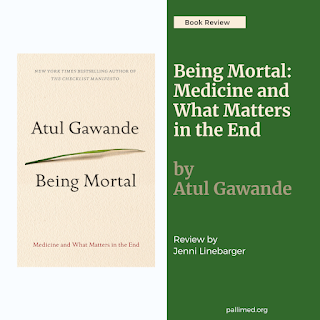Friday, October 24, 2014
A Physician Review of Atul Gawande's "Being Mortal"
The perspective of the storyteller is at the heart of Gawande’s latest book Being Mortal: Medicine and What Matters in the End. He tells us that life is meaningful because it is a story (p 238). In our current society, the end of the story tends to be one of dwindles and loneliness in a nursing home or of anxiety-driven medical interventions within a hospital. He offers up a different story.Gawande describes styles of assisted living that truly assist living; champions the need for geriatricians; and encourages each reader to “contemplate the unfixables in our life, the decline we will inevitably face” (p 47). He reminds readers to think not simply about being mortal, but also about what makes life worth living. Through telling the stories of others, he draws out the importance of defining the simple joys and components of quality of life.
In the second half of the book, Gawande shows how palliative care can help in defining what matters most to a seriously ill patient. Through time with a hospice team he learns, “The difference between standard medical care and hospice is not the difference between treating and doing nothing… the difference is in the priorities” (p 161-162). Within hospice and palliative care, the priority of quality of life becomes emphasized over quantity of life (life extension). He points out that having better quality can lead to quantity.
Gawande also talks about patients and families not ready to confront the reality of incurable disease. As Jon Stewart summarized during the October 5th interview on The Daily Show, Gawande shows how a conversation about mortality can be reasoned and compassionate. Gawande learned more about such a patient-provider conversation style from Dr. Susan Block. He outlines the content of his lessons from her, including advice to limit the phrases that distance yourself as a human from the patient in front of you: “I wish things were different” or “I am worried” (p 182).
And because this “storyteller” (or reviewer) read the book as a palliative care provider, I found the book to be more than a 286-page advertisement for the work we do.
- I appreciated his description of Carstensen’s work on the “socioemotional selectivity theory” showing that when life’s fragility is primed, people’s goals and motives in their everyday lives shift (p 94–99).
- I noted the buried call for meaningful metrics within the world of assisted living (p 105) as well as the call to train palliative care providers out of business (p 260).
- I chuckled when he shared how he was asked if a patient was dying and he noted, “I wasn’t even sure what the word ‘dying’ meant anymore,” (p 157) and goes on to say “We’ve built our medical system and culture around the long tail [of a patient-survival curve]” (p 175).
- I resonated when he said we are asking too much of families when we say “All-out treatment, we tell the incurably ill, is a train you can get off at any time – just say when” (p 187). Whenever I am in a care conference and hear that phrase, I let families know that palliative care ensure we stop at the train depots and talk about whether to stay on the train.
- I recognized the pendulum between the paternalistic relationship and the informative relationship and his appreciation for shared decision making, or a middle ground called “interpretive” (p 199-202).
“Endings matter, not just for the person but, perhaps even more, for the ones left behind” (p 232). Such awareness from his own father’s story speaks even more to the world of pediatric palliative care.
As he summarizes in the epilogue, “being mortal is about the struggle to cope with the constraints of our biology” and our job in medicine is not only to ensure health and survival… “it is to enable well-being” (p 259). Being Mortal (the book) highlights the importance of talking about what is important for feeling good in everyday life and letting those things guide us as the end of life draws near.
For more Pallimed posts by Dr. Linebarger, click here.
For more Pallimed book reviews, click here.
Disclosure of Material Connection: Neither the author nor Pallimed have received any compensation for writing this post. Neither the author nor Pallimed have any material connection to the brands, products, or services mentioned. Some of the links in the post above are “affiliate links.” This means if you click on the link and purchase the item, Pallimed will receive an affiliate commission. Regardless, we only recommend products or services we believe will add value to our readers. This disclosure is in accordance with the Federal Trade Commission’s 16 CFR, Part 255: “Guides Concerning the Use of Endorsements and Testimonials in Advertising.”


